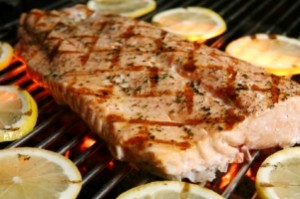 Rosh Hashanah marks the start of a new year in the Hebrew calendar. The Torah defines Rosh Hashanah as a day-long celebration, however on the Hebrew calendar, days begin at sundown. This year, Rosh Hashanah begins on September 28 at sundown and continues through the following evening.
Rosh Hashanah marks the start of a new year in the Hebrew calendar. The Torah defines Rosh Hashanah as a day-long celebration, however on the Hebrew calendar, days begin at sundown. This year, Rosh Hashanah begins on September 28 at sundown and continues through the following evening.
While some Jewish people only observe on one day, others observe both holidays with religious services and a traditional holiday dinner. Like many holiday meals, a Rosh Hashanah dinner is very symbolic, but can be on the indulgent side, with carb-laden kugels and challah.
This year, have your honey cake and eat it too, with some of our low-fat, low-calorie and low-carb holiday recipes.
Salads:
Roasted Acorn Squash, Pomegranate and Arugula Salad: Known as “the fruit of good deeds,” pomegranate is often present at Rosh Hashanah dinners. In addition, it offers powerful antioxidants and nutrients. Pair with roasted farm-fresh squash and arugula for a delicious salad.
Apple Carrot Salad: Carrots symbolize bounty in the Jewish culture, plus they contain beta carotene and Vitamin A that has been said to help improve night vision, nourish skin and even help prevent certain types of cancer.
Confetti Couscous: Couscous is a versatile African grain perfect when paired with meat or fish. Some say that the tiny couscous grains each represent a wish for the new year. Toss with some dried or fresh herbs and chopped green and red peppers to add a colorful, tasty dish to your table.
Cucumber Salad: Crisp and refreshing, you’ll enjoy this simple salad alongside some of the richer, heavier dishes at the table. Double it for a large crowd and make it ahead of time so you can serve it chilled.
Lemon Fish: Because Rosh Hashanah literally translates to “head of the new year” it is customary to serve fish or lamb head at your dinner table. If you’re a new cook (or if you’re squeamish) serve a simple lemon fish that will pair with any of your favorite side dishes.
Pot Roast: While there might not be anything better that mom’s brisket, this pot roast recipe only calls for four ingredients and with the fat trimmed, won’t set your diet back. The best part? This delicious home-cooked recipe won’t take all day, so you can focus on preparing the rest of your holiday meal.
Lemon Roasted Chicken: Hearty chicken with a zesty lemon flavor is an elegant centerpiece to any holiday meal and the Jewish New Year is no exception. You can even use leftover chicken for lunch or dinner later in the week.
Bread/Dessert:
Whole Wheat Challah from Diana’s Recipe Book: Served on the Sabbath as well as most Jewish holidays, challah is a traditional Jewish yeast bread. Often rich with eggs and braided, this version is made with whole wheat flour for added fiber and nutrition.
Greek Yogurt with Honey Roasted Figs: For an even sweeter New Year, serve leftover honey over fresh figs and thick, creamy Greek yogurt. Opt for low-fat or fat-free yogurt if you want a sweet dessert so you won’t have to spend the week after the holiday on the treadmill.
No-Fat Apple Cake from Rosa’s Yummy Yums: Apples dipped in honey are a symbolic Rosh Hashanah treat, meant to signify a sweeter new year. If you wind up with more apples than you can dip, bake a fat-free cake and replace the sugar for honey if you’re feeling especially authentic.

